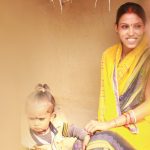HEALTH
Twenty eight-year old Kumkum Sinha joined as an ASHA at the Dhobi primary health care centre (PHC) in Gaya, Bihar in December 2008. She was a diligent worker who had learnt the ropes of interpersonal communication, community dialogue and social networking in order to be an effective communicator. She took pride in her acquired knowledge of government programmes and the confidence this gave her clients, especially the womenfolk who she visited regularly. Mostly, her interactions were related to issues like immunization, getting women to attend the Village Health and Nutrition Days, providing them advice on menstruation, institutional delivery, answering their questions around female reproductive system, sexually transmitted infections and natal health. In the process, if she sensed their need for medical attention, she referred them to the PHC for treatment.
“Earlier in my household visits I did not think it important to engage with newlyweds. I focused more on women who were pregnant or with 1-2 children. Post the trainings, I realised the huge gap in my understanding. A newly married girl was important and had to be dealt with in a gentle manner. I and my fellow ASHAs now lay lot of emphasis on breaking ice with them, gradually introducing the subject of family planning. We tell the ‘dulhan’ that she has options and choices. Also, that we are with her to help her decide what is best for her health”
Trainings, a source of socialisation and learning
When the suggestion by the Zero and Low Parity Pilot (ZLPP) team was made to undergo training, Kumkum was excited at the prospect of learning something new. Being part of a larger group of ASHAs was a major attraction because this way they would get to exchange notes about their individual experiences. However, once the Social Analysis and Action (SAA) training began, she was apprehensive. When the trainers asked her as to why she was not comfortable participating in the games and exercises, she responded, “our communities are very traditional. We have never talked to them directly about what family planning product they are using and how they must talk to their husbands on this taboo subject.” Once she aired her concern, other ASHAs too echoed a similar sentiment, saying they feared being ridiculed or snubbed by the husbands and elders in the family. Besides, how would they get over their own awkwardness about the subject. It seemed like an uphill task. Many of the ASHAs would burst into giggles or cover their faces with their hands, saying they would not be able to take these conversations forward.
The trainers spent considerable time using role play, power point presentations, videos and interactive games so that the ASHAs could learn more about family planning and find new ways of how to answer a range of questions related to this sensitive but much needed topic. Many different kinds of situa-tions were presented, like the newly married girl not being easily accessible to them for a private talk. Or the mother-in-law being outright rude and telling the ASHA to let the girl be and instead talk to them first.
These situations were enacted and the ASHAs were shown how to broach the subject, what kind of resis-tance to expect, how to be persistent without being nagging or forceful and how to be a good listener and observer. They were told that this was one subject that need not result in fruitful discussion in one meet-ing. It could take several meetings over few months before they could have a constructive conversation with the newly married girl or woman with one child.
Including family planning in the overall health discussions
As discussions became more intense, Kumkum realised how important it was to reach the newly married girl, who in many cases was not even 18 years of age, had limited knowledge about pregnancy and family planning and often had no one to talk to. The more she thought about it, the more urgent it seemed to her to reach out to the young girl, reassure her and provide her guidance. Kumkum became more involved in the training and was one of the first ASHAs to give a demonstration in a play-acting session on how to talk to a newly married girl about family planning, sexually transmitted infections and delay and spacing in pregnancy.
She showed what techniques she would use to draw the woman into an intimate conversation and encourage her to share her thoughts and feelings without fear. Gradually winning their confidence she would turn into a friend and confidante who they could trust. Over time she would guide the girl to educate herself on family planning options, discuss the same with her husband and then take a joint decision to adopt the same. The ease with which Kumkum acted this out won her an applause from the other participants.
She recalled one particular exercise that she had taken part in during the training. This was called, “Rudiwadi soch” and it drew attention to the ASHA’s personal biases that impacted and interfered with their household interactions. A case in point was how a newly married girl was often not even noticed. Her presence was acknowledged with just a casual smile and not much effort was made to include her in discussions till she became pregnant and had to be guided for her antenatal check-ups.
Making the effort to reach out to the newlywed woman
The ZLPP showed Kumkum and the other ASHAs, how to approach the newlywed or ‘Nayi Dulhan’ and how their approach had to be different from the one adopted for a woman with two children. A big shift was seen in the nature of communication. “Earlier we told them what to do or we shared what we knew was good for them but now we ask them what they feel, what they want, what they know and how they want to move ahead. We take our time in moving from one question to another.”
Kumkum shared that they no longer showed their impatience in goading the newlywed to choose from the different family planning products that were available. Instead they waited for them to grasp the new-found information telling them to sleep over it and discuss it with their husbands, sisters and close friends. Only when they reverted back to the ASHA wanting to know more would the discussion be taken forward. They were not pushed in any way or pressurised to make a decision. And certainly they were not asked to opt for the no-scalpel vasectomy (NSV) which was largely the case earlier.
The biggest learning has been in how the ASHAs broach this subject. They are much more patient and in no way judgmental. Also, they do not take it personally if the newlywed woman does not want to pursue the discussion further. They realise it is a personal and private matter and that their role ends with sharing the information and being available for follow-up anytime, even if it is months later. Surprisingly, the results to this approach have been good. Many newlywed girls have followed the advice given by Kumkum and asserted themselves to exercise their choice, negotiate for themselves and communicate to their husbands and mothers-in-law, what is good for them and their health.
Kumkum and her other ASHA colleagues go on record to say they have been helped a lot by the CARE Block Manager and the ZLPP Female Facilitator in having fruitful and conclusive discussions with the newlyweds. The ASHAs have learnt to talk effortlessly about emergency contraception, delay and spacing of pregnancy and are at ease clarifying doubts, providing linkages for procuring family planning products and in some cases making these available to the couples too.
About the Programme: In 2018, CARE launch a first-of-its-kind intervention where CARE introduced gender and sexuality in family planning programme focusing on zero (couples with no children) and low parity couples (couples with one child). The decision was based on finding from Currently Married Women of Reproductive Age (CMWRA) study which indicated that use of contraceptives was low and unmet need for spacing methods had only marginally increased.
The pilot was started with three objectives:
- Improve quality of interaction between ASHA workers and key target groups
- Increase couple communication around sexual reproductive health & family planning
- Enhance negotiation & communication skills of beneficiaries
Posted by: Family Planning Team (Health and Nutrition) CARE India
Location: Gaya, Bihar






